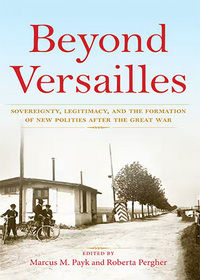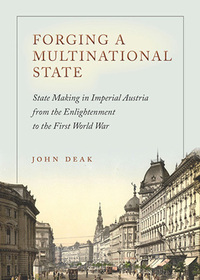
- University of Notre Dame
- Carl E. Koch Associate Professor of History
- Residential Fellow (2018-2019)
- "The State of Exception and the Fall of the Habsburg Monarchy in the First World War"
John Deak is the Carl E. Koch Associate Professor of History at the University of Notre Dame, where he specializes in the history of the Habsburg Empire and its successor states. He is broadly interested in questions regarding power, state authority, and constitutional law, especially when they intersect with questions of citizenship and human dignity. He is currently exploring the First World War and the legal state of exception that accompanied it in the Habsburg Empire.
Professor Deak is the author of Forging a Multinational State: State Making in Imperial Austria from the Enlightenment to the First World War (Stanford, 2015), which was awarded the Austrian State Prize for Social Science History in April 2018. His work on the First World War has been published in the Journal of Modern History and, most recently (with Jonathan Gumz), in the American Historical Review. He serves on the editorial board of Administory (a journal of administrative history) and Central European History.
Professor Deak’s research has been supported by the Austrian Federal Ministry for Education and Research. He has been a visiting professor at Bielefeld University in Germany and his teaching has been recognized with a Rev. Edmund P. Joyce, C.S.C. Award for Excellence in Undergraduate Teaching at Notre Dame.
Publications
-
Fashioning the Rest: National Ascription in Austria After the First World War
Indiana University Press, 2019

The settlement of Versailles was more than a failed peace. What was debated at the Paris Peace Conference of 1919–1920 hugely influenced how nations and empires, sovereignty, and the international order were understood after the Great War—and into the present. Beyond Versailles argues that this transformation of ideas was not the work of the treaty makers alone, but emerged in interaction with nationalist groups, anti-colonial movements, and regional elites who took up the rhetoric of Paris and made it their own. In shifting the spotlight from the palace of Versailles to the peripheries of Europe, Beyond Versailles turns to the treaties’ resonance on the ground and shows why the principles of the peace settlement meant different things in different locales. It was in places a long way from Paris—in Polish borderlands and in Portuguese colonies, in contested spaces like Silesia, Teschen and Danzig, and in states emerging from imperial collapse like Austria, Egypt, and Iran—that notions of nation and sovereignty, legitimacy, and citizenship were negotiated and contested.
-
Forging a Multinational State: State Making in Imperial Austria from the Enlightenment to the First World War
Stanford University Press, 2015

The Habsburg Monarchy ruled over approximately one-third of Europe for almost 150 years. Previous books on the Habsburg Empire emphasize its slow decline in the face of the growth of neighboring nation-states. John Deak, instead, argues that the state was not in eternal decline, but actively sought not only to adapt, but also to modernize and build.
Deak has spent years mastering the structure and practices of the Austrian public administration and has immersed himself in the minutiae of its codes, reforms, political maneuverings, and culture. He demonstrates how an early modern empire made up of disparate lands connected solely by the feudal ties of a ruling family was transformed into a relatively unitary, modern, semi-centralized bureaucratic continental empire. This process was only derailed by the state of emergency that accompanied the First World War. Consequently, Deak provides the reader with a new appreciation for the evolving architecture of one of Europe’s Great Powers in the long nineteenth century.
-
The Reichsrat in 1917/18 and the Beginning of the First Republic
Contemporary Austrian Studies, 2020
The essays in this volume are dedicated to the ups and downs of 100 years of Austrian democracy. On the occasion of the founding of the First Austrian Republic on November 12, 1918, Austrians celebrated the 100th anniversary of this event in recent Austrian history. Due to the deep divisions of the Austrian political camps (parties) democratic governance was troubled in the 1920s and ended in authoritarian rule in 1933. After World War II, the two principal political parties ÖVP (Christian conservatives) and SPÖ (Socialists), learned to work with one another in grand coalition governments and established a stable democratic regime. With the “Freedom Party” (FPÖ) turning populist, xenophobic and anti-European Union, paired with the arrival of new parties such as the environmentalist/progressive “Greens,” the Austrian party system realigned in 1986 and new center-right coalitions (ÖVP and FPÖ) came to govern Austria. Today political campaigns in Austria, too, are run on social media and millennials have less faith in democracy.